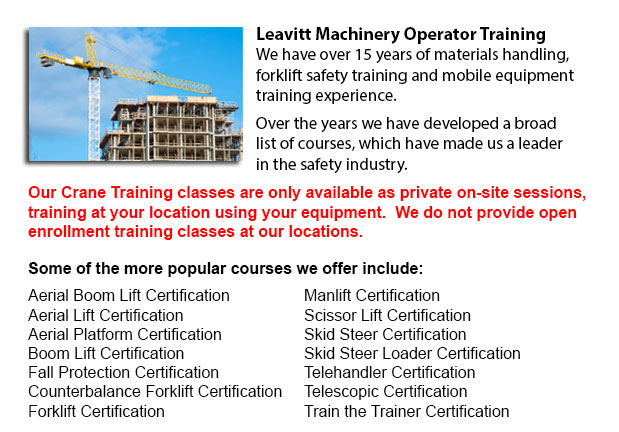
Kamloops Crane Operator Certification - The process to permit you in order to operate certain kinds of cranes is to take crane operator certification training to get certification. The certification process consists of classroom learning, hands-on practice and an ability evaluation. Various training programs are available for overhead cranes, mobile cranes, boom trucks, tower cranes, forklifts and other hoisting devices. Trainees would know the fundamentals of safety, equipment characteristics, and operational practices related with these types of cranes.
Customized Practical Training and Evaluation:
Companies could request customized practical training and evaluation on-site at the work facility following the in-class session. Two operators would be trained at a time by one instructor. The length of time needed for training will vary depending on machine kind and the employees' levels of ability, but generally needs one to two hours. The training will focus on practical skills like planning the lift, correct rigging practices and safe operating procedures. Employers should schedule the on-site session in advance.
After in-class instruction, practical operating instruction and assessment, and written test, the trainee would be given an individual wallet certificate and the company would be given a wall certificate. To achieve certification, trainees must have an 80 percent passing score on both practical and written exams.
Included in the crane operator certification program is the following: Guidebooks, policies and regulations; dangers of high voltage; safety concerns; emergency rescue procedures; communications and signals; components, terms and types; pre-operational inspection; pre-lift planning and set-up; crane capacity and configuration; hammerhead / luffing jib crane operations; wire rope and rigging; climbing cranes; fall protection; WHMIS; crane maintenance and CPR & First aid.
The minimum prerequisites for becoming an overhead crane operator consist of possessing the physical and mental capability needed to carry out crane work. Basic capabilities comprise normal field of vision, depth perception, manual dexterity, reaction time and coordination. Potential operators should not have the tendency to become lightheaded. Operators who do not already have evidence of qualifications and experience must achieve certification. Operators must be qualified to operate the certain type of machinery that they would be making use of to perform their work.
-
Kamloops Counterbalance Forklift Training
Kamloops Counterbalance Forklift Training - Counterbalance Forklift Training courses are always in high demand. The Counterbalance forklift is a forklift which is made with a weight which counters the balance, equally spreading the weight of the load... More -
Kamloops Manlift Certification
Kamloops Manlift Certification - The Manlifts and Elevated Platforms program offers training on the rules, regulations and proper application of safe operating measures and work practices included in daily activities for people who work making use of... More -
Kamloops Boom Lift Training
Kamloops Boom Lift Training - Elevated work platforms, likewise referred to as aerial platforms, allow workers to carry out tasks at heights that will otherwise be not reachable. There are various styles of lifts designed for different site applicati... More -
Operator Safety Certification | Re-Qualification Certification | In-House Instructor Certification in Kamloops
Forklifts are used in just about all industrial construction sites and in warehouse operations and in boat yards. The reach feature of a lift truck is a vital component used in several applications like for instance when a shelving system is being us... More -
Kamloops Manlift Safety Training
Kamloops Manlift Safety Training - It is essential for competent Manlift operators to be aware of the connected dangers that come with particular kinds of scissor lifts. They must be able to operate the scissor lift in a way that protects not only th... More -
Kamloops Crane Training Schools
Kamloops Crane Training Schools - We have designed several programs for Mobile Crane Operation at our Crane Training Schools. These programs are recommended for the experienced operator who requires certification or re-certification, and for inexperi... More -
Skid Steer Loader Certification in Kamloops
The engine powered skid-steer loader consists of a rigid and small frame, outfitted together with lift arms which could attach to a lot of industrial attachments and tools to perform several labor saving jobs. Typically, skid-steer loaders are four-w... More -
Kamloops Heavy Equipment License
Kamloops Heavy Equipment License - A heavy equipment license could be acquired by taking a certification and preparation course at a private training school or a vocational school. This license would qualify you to operate various types of heavy mach... More

Forklift Certification Kamloops
TOLL FREE: 1-888-254-6157
Kamloops, British Columbia
forkliftcertificationkamloops.com/
Email Us
About Us


